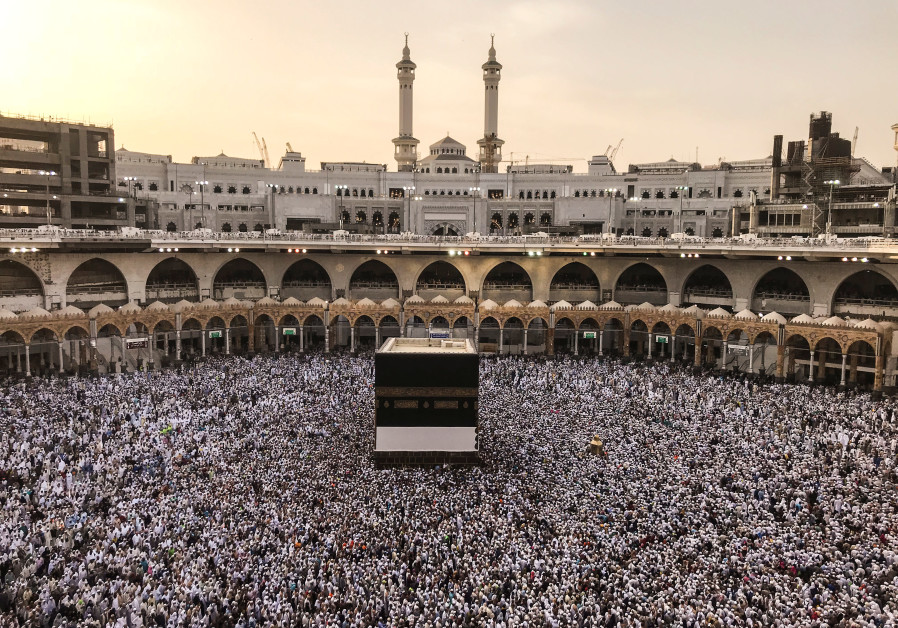Muslims at hajj blame Arab disunity for Jerusalem embassy move

Muslim pilgrims circle the Kaaba and pray at the Grand mosque ahead of annual Hajj pilgrimage in the holy city of Mecca, Saudi Arabia August 16, 2018. (photo credit: ZOHRA BENSEMRA/REUTERS)
ARAFAT – Muslims at the annual hajj pilgrimage in Saudi Arabia criticized what they described as discordant Arab leaders for failing to block President Donald Trump’s decision to move the US Embassy to Jerusalem after he recognized the city as Israel’s capital.
It was a reversal of decades of American policy and the embassy opened in May at a high-profile ceremony attended by Trump’s daughter Ivanka and his son-in-law Jared Kushner, the US envoy to the Middle East.
The status of Jerusalem – home to sites holy to the Muslim, Jewish and Christian religions – is one of the biggest obstacles to any peace agreement between Israel and the Palestinians.
The United Nations says the status of the ancient city – whose eastern sector was captured by Israel in the 1967 Middle East war – can only be resolved by negotiations. Palestinians claim East Jerusalem for the capital of an independent state they seek. Israel says Jerusalem is its eternal and indivisible capital.
“This happened with the complicity of the Arab leaders,” 53-year-old Saad Awad from Sudan said on Monday as he walked east of Mecca with more than 2 million fellow Muslims from around the world.
“If the Arab leaders were united and adhering to the Koran and the Sunna (Islamic practice based on words and deeds of the Prophet), it would be impossible for the Americans or anyone else to do something like this.”
Saudi Arabia, which stakes its reputation on its guardianship of Islam’s holiest sites – Mecca and Medina – and organizing the hajj, has urged pilgrims to put aside political concerns and focus on spirituality.
(function(w,d,s,i){w.ldAdInit=w.ldAdInit||[];w.ldAdInit.push({slot:10834723912266086,size:[0, 0],id:”ld-9628-9059″});if(!d.getElementById(i)){var j=d.createElement(s),p=d.getElementsByTagName(s)[0];j.async=true;j.src=”//cdn2.lockerdomecdn.com/_js/ajs.js”;j.id=i;p.parentNode.insertBefore(j,p);}})(window,document,”script”,”ld-ajs”);
The five-day ritual, the world’s largest annual gathering of Muslims, is a religious duty once in a lifetime for every able-bodied adherent who can afford it.
Few pilgrims openly censured the host country, but dismay among ordinary Arabs at the embassy move has been tinged with anger at regional governments – particularly those of the oil-rich Gulf monarchies – for failing to stop, or even strongly protest against, Trump’s decision last December.
“The Arabs are weak and have not taken a stand on the issue of Jerusalem,” said Algerian pilgrim Hilal Issa, 70.
Some critics accuse Saudi Arabia, the birthplace of Islam, of surrendering Palestinian rights for the sake of its alliance with Trump and his tough stand on Iran.
While Saudi Arabia and its fellow monarchies have previously criticized the embassy decision, they have also welcomed Trump’s harder line against Iran, which has cast itself as the guardian of Palestinian rights.
In recent years the bitter regional rivalry that pits Shi’ite Muslim Iran and its allies against a bloc led by Sunni Muslim-majority Saudi Arabia has increasingly pushed the decades-old Arab-Israeli struggle into the background.
King Salman has reassured Arab allies Riyadh would not endorse any peace plan that fails to address Jerusalem’s status or other key issues, Reuters reported last month, easing concerns that the kingdom might back a nascent US deal which largely aligns with Israel.
“If the Arabs were united, nobody would have dared make such a move,” Yemeni pilgrim Amr Ahmed Ali said of the embassy transfer. “But God willing, the Arabs will unite, and this city will unite the Arabs and Muslims behind one cause which is the Palestinian cause.”






Comments are closed.